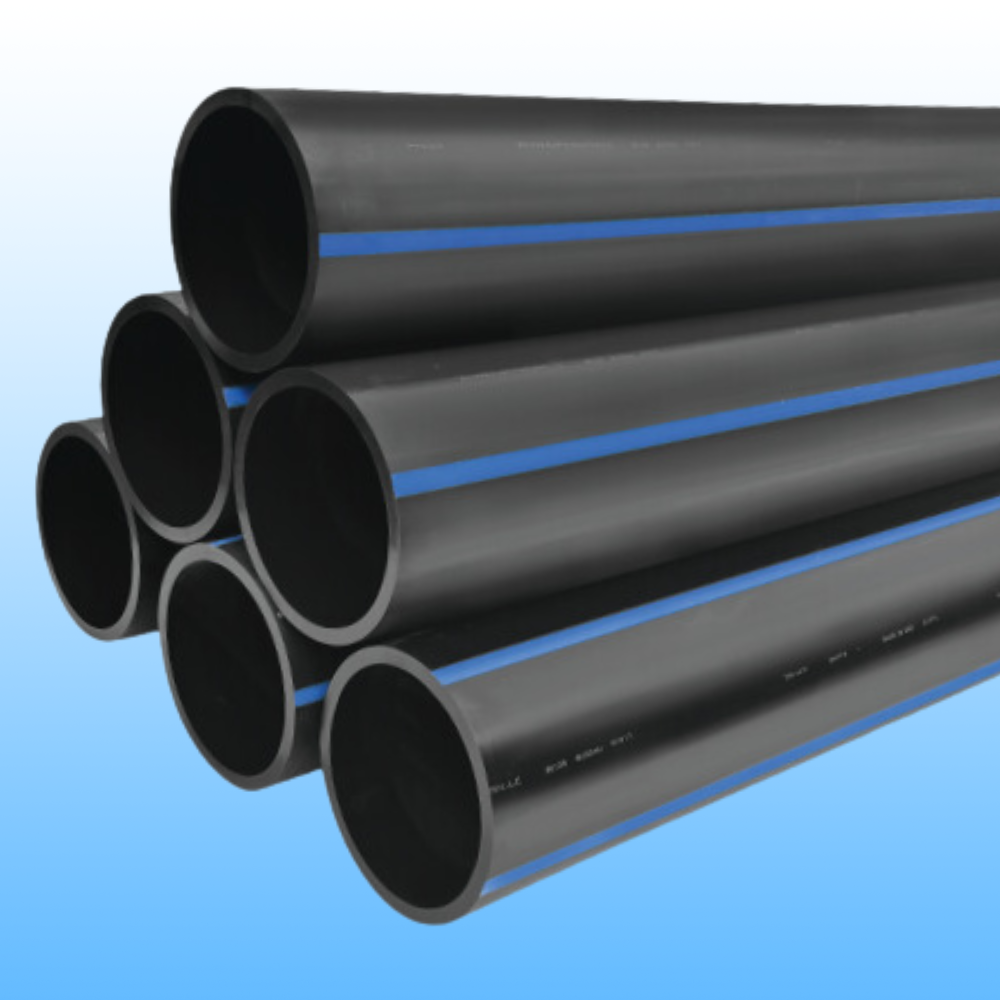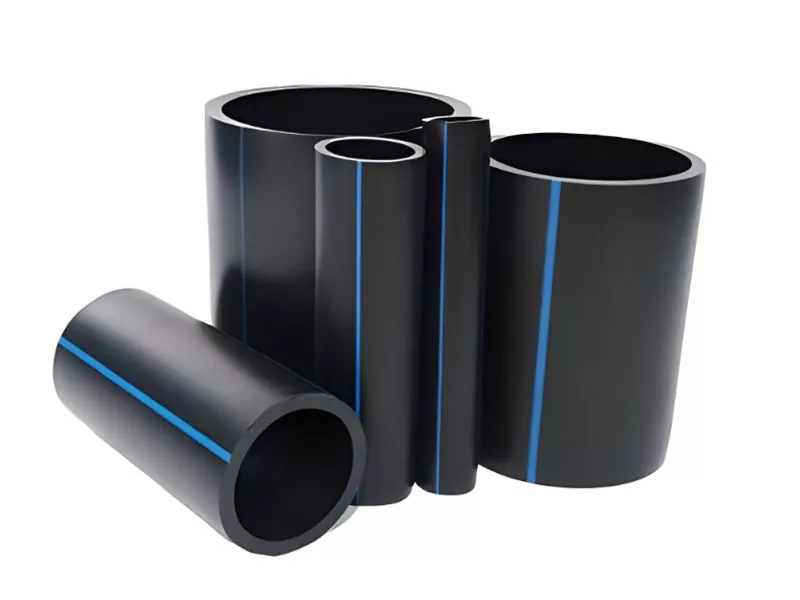A Comprehensive Guide to the Various Uses HDPE Pipe in Building and Market
HDPE pipelines have actually arised as a pivotal part in modern-day construction and industrial applications. Their one-of-a-kind homes, such as resistance to corrosion and lightweight style, make them ideal for a large range of usages. From supply of water systems to agricultural watering, HDPE pipes supply options that boost performance and sustainability. Understanding their varied applications is vital for experts wanting to maximize framework. What particular advantages do these pipelines offer each market?
Supply Of Water and Distribution Equipments
Water supply and circulation systems are critical parts of urban framework, typically counting on high-density polyethylene (HDPE) pipelines for their toughness and effectiveness. These systems transport potable water from treatment facilities to consumers, making certain ease of access and safety and security. HDPE pipes are preferred for their resistance to deterioration, chemicals, and severe temperature levels, which improves their durability and decreases upkeep expenses. Additionally, their light-weight nature permits for easier setup and transport, making them optimal for various metropolitan and country applications.
The adaptability of HDPE pipelines allows them to be mounted in tight rooms and around obstacles, lessening the requirement for extensive excavation (Midland TX HDPE Pipe Fittings in Stock). Their smooth interior surface area minimizes friction losses, improving water flow rates. As cities continue to expand, the demand for dependable water systems raises, placing HDPE pipelines as a lasting option for modern-day framework projects. Their tested record makes them a recommended choice among designers and urban planners alike
Wastewater Administration and Treatment
Effective wastewater monitoring and therapy are crucial for keeping public health and wellness and environmental high quality. HDPE pipes play an important duty in this procedure as a result of their longevity, resistance to corrosion, and capacity to withstand severe chemicals. These pipes are commonly utilized in various applications, including sewer system, stormwater drain, and wastewater therapy facilities. Their lightweight nature promotes much easier installment and transportation, decreasing labor prices and time.
Additionally, HDPE pipes have a smooth indoor surface that decreases friction loss, advertising reliable circulation rates. They are also much less vulnerable to leakages and failures compared to conventional products, making sure that contaminants are included successfully. Moreover, their adaptability permits for adaptability in various soil conditions, making them appropriate for varied ecological settings. As sectors significantly prioritize lasting practices, using HDPE pipes in wastewater management systems lines up with objectives for reducing ecological effect and enhancing source recuperation.
Agricultural Irrigation Solutions
In agricultural setups, effective watering remedies are important for optimizing plant returns and handling water sources. HDPE (High-Density Polyethylene) pipes play a crucial function in modern irrigation systems as a result of their longevity, versatility, and resistance to deterioration. Their capability to hold up against high pressures makes them excellent for both surface and subsurface watering applications, guaranteeing consistent water distribution Discover More across fields.
Farmers can use HDPE pipelines in drip watering systems, which provide water directly to plant origins, decreasing waste and advertising healthy and balanced growth. Furthermore, these pipes are light-weight and simple to set up, decreasing labor costs and setup time. Their long life expectancy and low maintenance requirements further boost their allure in farming methods.
Additionally, HDPE pipelines are environmentally pleasant, as they can be reused and do not leach dangerous chemicals right into the soil. This makes them a lasting option for farmers aiming to take on environment-friendly agricultural approaches while taking full advantage of productivity.
Industrial Applications and Processes
Adaptability is a hallmark of HDPE pipelines, making them indispensable in numerous commercial applications and procedures. These pipes are extensively used in chemical handling markets due to their exceptional resistance to a vast array of corrosive compounds. HDPE's lightweight nature, incorporated with high tensile stamina, permits simple installment and long-term efficiency sought after environments.
In the oil and gas sector, HDPE pipes play a necessary role in moving hydrocarbons and gases, thanks to their durability and adaptability - Pipe Supplier American Plastics Midland. In addition, they are employed in mining procedures for the transport of slurry and other materials, where conventional piping systems might fail
In addition, HDPE pipelines are increasingly used in manufacturing facilities for water supply lines and wastewater administration. Their ability to endure extreme temperature levels and pressures makes them suitable for a selection of industrial processes. Generally, HDPE pipes contribute greatly to efficiency and safety and security across diverse commercial applications.
Stormwater Management and Drainage Equipments
Stormwater monitoring and drainage systems are vital elements in city framework, developed to take care of excess rainfall and lower flooding dangers. High-density polyethylene (HDPE) pipes are progressively made use of in these systems as a result of their resilience, versatility, and resistance to corrosion. These pipelines effectively deliver stormwater far from booming locations, minimizing surface overflow and protecting against waterlogging.
HDPE's lightweight nature promotes easier installment, decreasing labor expenses and building time. Additionally, its resistance to chemicals and ecological stress factors guarantees longevity and dependability in different climates. In addition to standard drainage applications, HDPE pipelines are also employed in cutting-edge options such as eco-friendly infrastructure, which consists of rain gardens and absorptive sidewalks.

Regularly Asked Inquiries
Exactly How Does HDPE Pipeline Compare to PVC Pipe in Price?
Generally, HDPE pipe tends to be extra expensive than PVC pipeline due to its improved toughness and flexibility. However, lasting price considerations, such as maintenance and life expectancy, may favor HDPE in details applications.

What Is the Life Expectancy of HDPE Pipes Under Numerous Problems?
HDPE pipelines generally have a lifespan of 50 to 100 years, depending upon environmental conditions, installment techniques, and usage. Aspects such as temperature level, dirt type, and direct exposure to chemicals can greatly affect their sturdiness.
Can HDPE Pipes Be Recycled After Use?
Yes, HDPE pipes can be recycled after use. The recycling process entails thawing down the product, permitting it to be repurposed into brand-new items, consequently advertising sustainability and decreasing ecological influence related to plastic waste.
Exist Any Type Of Particular Installment Obstacles With HDPE Pipes?
Installment obstacles with HDPE pipes include appropriate jointing methods, making certain This Site sufficient trench conditions, and handling thermal growth. Furthermore, knowledgeable labor is needed to handle customized devices, which can complicate the setup process in different environments.

What Certifications Should I Look for When Purchasing HDPE Pipings?
When acquiring HDPE pipes, one should seek accreditations such as ASTM, AASHTO, and ISO, which confirm high quality and conformity with industry standards, guaranteeing resilience and efficiency in different applications. - American Plastics HDPE Pipe Manufacturing